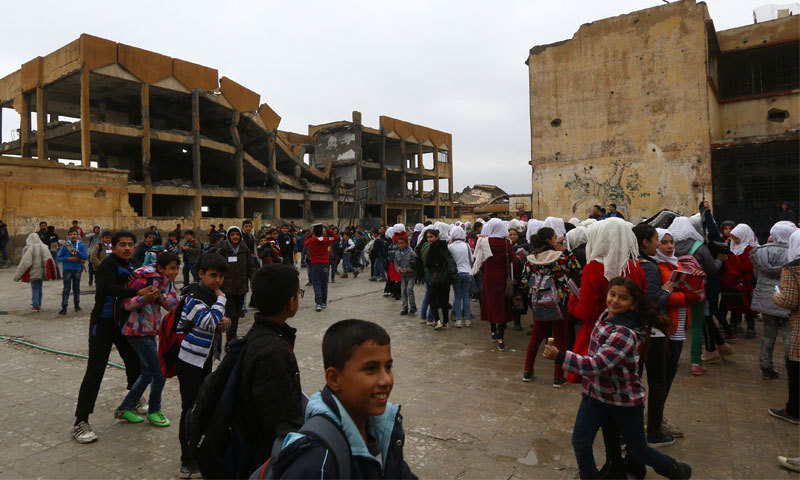



Raqqa- Hussam al-Omar
The nine-year-old Abbas al-Hassan sadly returned to his family’s neighborhood of the Rumaila northeast of Raqqa city since he no longer bears the daily bullying as a son of an Islamic State (IS) fighter. The school atmosphere, fraught with verbal abuse towards Abbas, prompted him to enter into a quarrel with one of his schoolmates, which led to him dropping out.
The mother of Abbas, Omaima al-Hassan, 37, assured that her son had constantly endured abuse from his peers at school, calling him “Daeshi” because his father was a fighter within the IS group dubbed in Arabic “Daesh.”
The children of IS fighters face daily hurdles and challenges preventing them from integrating with their peers, whether they are in school or in the neighborhoods in which they live.
Al-Hassan was freed with her child from the Syrian Democratic Forces (SDF)- administrated al-Hol camp eight months ago, following a tribal mediation, to head to her family’s home in the Rumaila neighborhood, after her house was demolished by the bombing of US-led International Coalition airstrikes during Raqqa battles that uprooted the IS group in October 2017 from the so-called capital of the ‘Islamic caliphate.’
The challenges are not restricted to verbal abuse or bullying, as the sons and their mothers face economic challenges represented in the loss of most of these families of the breadwinner, given that the head of the family either has been killed or is still held by the SDF.
Children of IS fighters are usually pushed by their mothers and relatives to work in occupations some of which may be dangerous to their lives or exceed their physical capacities, such as construction workshops or laboratories and industrial facilities due to the children’s inability to integrate with the rest of their peers at school.
Despite the modest number of children who returned to Raqqa from the detention camps of IS families and the lack of official statistics revealing the exact number, their lack of integration with their peers at school is still a tangible reality, according to a member of the Education Committee of the Raqqa Civil Council.
A member of the Education Committee, who spoke on condition of anonymity since he is not authorized to declare to the media, said it is wrong to push these children directly to public schools in the city.
The committee member told Enab Baladi that a rehabilitation center should be opened in Raqqa which includes children of IS fighters, before any attempt to integrate them into the local community, because “if the child is left without care or rehabilitation in public schools, the matter may exceed the limits of bullying, and the child will be rushed to more introversion and isolation from society.”
Civil society organizations in Raqqa offer sessions to renounce the nature of the extremist life that women of former IS fighters may bear, especially those who have recently left the al-Hol camp, but it is very rare for wives of IS fighters to be present in these sessions.
The public schools’ administration is also responsible for holding special education classes to raise awareness against bullying or moral violence against children among themselves, according to the Education Committee member, since this problem interferes with the child’s behavior to cause him a daily problem, such as headaches, lack of focus or confusion in thinking and stuttering, and not wanting to go to his usual places such as school, which means a change in his schooling level.
Blaming the child for a matter was not his/her fault, and creating a worrying social stigma associated with him/her, is a problem that warns of psychological risks that negatively affect children and their social behavior, whether within the community or within the family to which the child belongs, according to the Raqqa-based psychiatrist Mohsen Suleiman.
The psychiatrist told Enab Baladi that the solutions that can be followed to treat such cases fall into two categories, the first being precautionary solutions, including awareness campaigns and intellectual seminars.
As for the second field of solutions, it is the solutions that are treated after psychological symptoms of bullying appear, in which the person who shows these symptoms is targeted by trying to integrate him in the society and avoiding the exclusion that may push him to find mechanisms for revenge in the future, Suleiman added.
Educating society to overcome this social stigma falls on the shoulders of civil society organizations and its programs and projects related to the social unity in Raqqa, the psychiatrist concluded.
if you think the article contain wrong information or you have additional details Send Correction